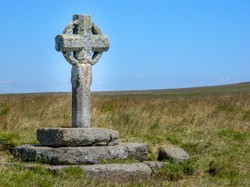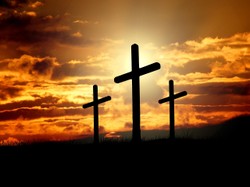Part of growing up is to widen your mind, and my mind widening involved realizing that there were there people who disagreed with me, which I knew already, but that they did not see much weight in my arguments, a view that was reinforced by my experience of the school discussion group. To even things out, I saw little weight in theirs. At theological college I soon became aware that even within the supposed monolith of Catholicism there were serious differences of opinion. I argued much during that period, and have not really changed much since then! So my faith has had to grow in an encounter with intellectual opposition, which has tested its muscles and honed them. My faith survived.
Over the years I began to develop an interest in religious experience, which is one of my specialist academic areas.I began to realize that at the root of all genuine religion is what Beardsmore calls a sense of presence, and what Martin Buber calls presence/power. This is not the spectacular religious experience of the vision or mystical experience, though I once at twenty three underwent one of the latter, a few moments of nature mysticism when sitting atop Pen yr Oleu Wen one fine summer day in the Welsh mountains. For me religious experience is a sense that one is being empowered and/or guided in the direction of the good, it is a sense that there is more to the world than the material reality that we see and hear.
But religious experience alone does not suffice,for it is too vague and elusive and can let you down in moments of darkness and emptiness. . All human growth of mind occurs in community, and our thoughts are shaped by the ideas of the community to which we belong. My religious experience was mainly within the community of the church, which provided the conceptual framework for its formulation and use. The church allows us to share the religious experience off others, for alone our religious experience is not enough.
Valuing the church does not mean that everything in the Christian church is rosy and that any church, including mine, is right on everything,but that the main ideas are right.Right as far as they go, for only a simplistic person would think that we have done anything but sip at the divine mysteries which fascinate us. Realizing that our faith is just a tiny taste of a great mystery empowers us to grow in times of difficulty and darkness rather than give up.
Being saved is an important part of the Christian experience. For some the experience of being saved is a bombshell that erupts into consciousness at a Bible meeting. But I have always insisted to my charismatic and evangelical brethren that the path to God contains many ways, and for me the experience of being saved was not found in a single moment, but in an awareness that my nature and individual personality contain a dark side that can only be overcome by God.








 Darkness over the Earth the skies darkened when Jesus was crucified23 days ago
Darkness over the Earth the skies darkened when Jesus was crucified23 days ago
 TheThousand Year Gardenon 11/26/2025
TheThousand Year Gardenon 11/26/2025
 Women of the Gospelson 10/11/2025
Women of the Gospelson 10/11/2025
 Religious Gardenson 08/25/2025
Religious Gardenson 08/25/2025




Comments
Yes, darkness is sometimes a time for quiet prayer
Thank you for your comment below in answer to my previous question.
Liminal places appear quite recognizable if they associate with land and water, light and dark, sky and earth.
And yet dark components can be part of religiously, spiritually unfriendly places, can't it?
No. Liminal places are the zonescwhere different elements meet. Light and darkness, land andbwaterbsky and earth.
Thank you for your comment below in answer to my previous observations and questions.
You discuss religiously, spiritually friendly, thin-veiled liminal places elsewhere.
Does the White Slope equate to a liminal place?
A sense that nature was becoming transparent to a great presence.this experience was akin to Wordsworth's experience at Tintern Abbey. It has never been repeated. As for ascending Pen yr Oleu Wen again my illness has seriously impaired my mobility, so I cannot climb a mountain again. Sad, but that is life. Pen yr Oleu Wen is so named as its rocks are a white rhyolite.
The second paragraph to your second subheading, The Content of Faith, considers that "Over the years I began to develop an interest in religious experience, which is one of my specialist academic areas.I began to realize that at the root of all genuine religion is what Beardsmore calls a sense of presence, and what Martin Buber calls presence/power. This is not the spectacular religious experience of the vision or mystical experience, though I once at twenty three underwent one of the latter, a few moments of nature mysticism when sitting atop Pen yr Oleu Wen one fine summer day in the Welsh mountains. For me religious experience is a sense that one is being empowered and/or guided in the direction of the good, it is a sense that there is more to the world than the material reality that we see and hear."
What did that nature-mystical experience atop Pen yr Oleu Wen involve? Does it come back every time that you go back there, to the "Head of the White Slope"?
(Why is Pen yr Oleu Wen considered a "white" slope? Internet images make it look somewhat brown and gray!)
A pastor who delivers insightful messages! A blessing indeed. Such a pastor can only do this if he is not only a scholar, but a person of faith and personal holiness. All preaching is an outpouring of the preacher's soul. It strikes me that an eloquent, scholarly, but spiritually weak preacher will be less effective than a spiritually sincere, but less scholarly one. I can recall a priest who was not a talented preacher, but he always worked hard at preparing his sermons, and his witness to his faith shone through his inadequacies.
Faith sees you through difficulties, for it gives you a longer term perspective on life. Be strong.
I believe there is a lot to think about in this article. Although I was brought up as a Christian, I never really embraced that until I was far into adulthood. When I began attending a good church, with a Pastor who delivered insightful messages, then I delved deeper into the Bible and my quest for knowledge. I was gung ho at that point, and later, as life became tough for me, I leaned on my belief and faith to get me through. Recently my faith is being challenged again, so as you say, it's a lifelong growing experience.
You are correct in this matter,for the experience of God in and through nature is very important. Considering that sacrament is a way in which the sacred is mediated by matter, perhaps nature is a kind of sacrament for the divine presence /power.
Indeed, many cultures have sought a deity through nature, a way Gd reveals much of Himself to humanity. Hence the cultures that viewed the sun as a god. Finding God in nature is a basic instinct of most humans.